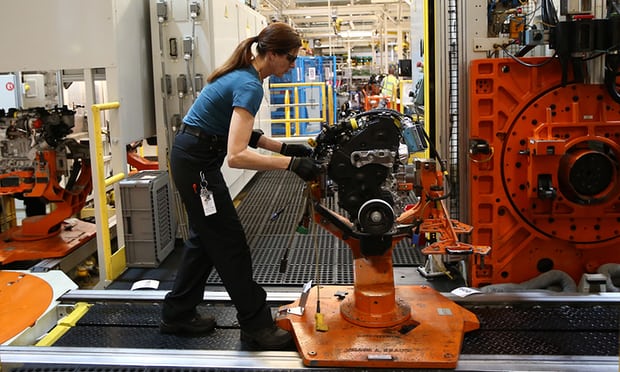UK car production went into reverse last year for the first time since the depths of the financial crisis in 2009, as Brexit fears took hold and consumers turned their backs on diesel vehicles.
A total of 1.67m cars rolled off UK production lines in 2017, down 3% compared with 2016 as demand for British-made cars dropped both at home and abroad, according to the Society of Motor Manufacturers and Traders (SMMT).
The number was about 130,000 below the industry’s forecast, largely because of a near 10% fall in domestic buyers as cash-strapped households in Britain were increasingly reluctant to commit to major spending decisions. The SMMT also blamed “confusion” over the government’s policy on diesel.
The trade body warned 2018 was likely to be another tough year for the UK industry, which is facing the prospect of declining investment and zero growth in production volumes.
Companies including Toyota, Jaguar Land Rover, and McLaren last year committed to a total of £1.1bn in future investment in the UK, down 34% compared with the £1.66bn committed in 2016 and below the average over the past few years.
“A drop of that magnitude is a concern,” said Mike Hawes, chief executive of the SMMT, as he warned the government needed to provide “urgent clarity” on a transitional Brexit deal so that companies could press ahead with crucial spending decisions.
“Transitional arrangements must retain all the current benefits or else around 10% of our exports could be threatened overnight,” Hawes said.
“We compete in a global race to produce the best cars and must continue to attract investment to remain competitive. Whilst such investment is often cyclical the evidence is that it is now stalling, so we need rapid progress on trade discussions to safeguard jobs and stimulate future growth.”
The UK industry has abandoned a target to build more than 2m cars a year by 2020 – breaking a previous record of 1.92m in 1972 – because of the scale of uncertainty posed by Brexit.
A worker on the engine production line at Ford’s factory in Dagenham.
An employee works on the engine production line at Ford’s factory in Dagenham in Essex. Photograph: Carl Court/Getty Images
“It’s hard to see [the industry achieve] that when we have this period of uncertainty. We still hope that we can maintain the inherent strengths that we have, but circumstances have undoubtedly changed,” Hawes said.
About 80% of cars made in Britain are destined for export markets. In 2017 vehicles made for overseas markets fell 1.1% to 1.33m, while those made for sale in the UK fell 9.8% to 336,628. The EU is the UK’s biggest export market for cars, with more than half of all exports destined for the single-currency bloc.
Hawes said there was a risk that Britain was so distracted by Brexit that it could fall behind other countries focused on the development of electric and driverless technology.
“That’s the danger when you’ve got uncertain times. Every company is modelling different scenarios and trying to make sure they’re in the best possible place,” he said.
Theresa May met industry leaders in November to discuss their concerns about the sector after Brexit.
Andy Barratt, chairman and managing director of Ford in the UK, which employs about 14,000 people, said the government had listened to their concerns. “We have an active voice. The industry has been very clear and consistent about what it needs.” Barratt said Ford was still investing in its engine plants at Dagenham in Essex and Bridgend in South Wales.
Mick Flanagan, vice-president at Adient, which makes the seats for one in every three cars produced around the world, said that delays of just two to three hours at a customs border would create a “big problem” because production lines run with “military precision”.
Last week Jaguar Land Rover, Britain’s biggest car manufacturer, announced plans to cut production at its Halewood plant near Liverpool, blaming faltering sales after the Brexit vote and a tax crackdown on diesel vehicles.
Courtesy of theguardian.com
[tribulant_slideshow featured=”true” featurednumber=”4″ featuredtype=”post”]



